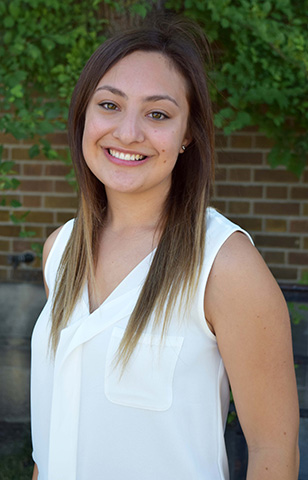Trading places
For the past nine years, Ashley Zwaiman spent the summer months at a camp in Haliburton, Ont.—first as a camper, then as a counsellor in training and more recently as a staff “trip specialist” where she would take small groups of campers to Algonquin Provincial Park on multi-day canoe trips. This year she decided to trade the great outdoors for a chance to explore her interest in health sciences research and work in the trauma health services research program at Sunnybrook.
Zwaiman is a first-year undergraduate student in biomedical science at the University of Guelph. She is part of the D+H SRI Summer Student Research Program working with Dr. Lesley Gotlib Conn, an affiliate scientist in the Trauma, Emergency & Critical Care Research Program and a medical anthropologist at Sunnybrook. Gotlib Conn’s research focuses on applying anthropological research methods such as qualitative research and ethnography (the study of people and cultures) to understand the factors that influence interprofessional collaboration, physician communication and quality improvement research in surgery.
“I’ve actually never done research before, so Dr. Gotlib Conn has really shown me the foundation and guided me every step of the way,” says Zwaiman. “She’s given me more than a research education. We go to weekly research meetings and I’ve gone to rounds in the trauma ward. I’m not only getting the research aspect, but a very good look into surgery and trauma as a whole.”
Zwaiman is working on a qualitative research project that aims to improve the quality and safety of care transitions for Sunnybrook’s trauma patients. Known as the IMPACT study, short for Improving Patient Safety and Quality of Care in Transition from Acute Trauma Care Hospitalization, the long-term objective is to implement and evaluate improvements in discharge and care transitions processes. Phase 1 of the study aims to understand better trauma patient and family information needs and gaps after discharge. The study is recruiting 30 patients to participate in telephone interviews four to six weeks after hospital discharge. The interview questions explore the patients’ experiences with discharge and whether the information they received was timely, accessible and sufficient for a safe care transition.
“The area of research is to really focus on what the gaps are in making a seamless transition from acute trauma care to either rehab, community hospital or home,” she says about understanding better the patient experience. “My job is to analyze the patient interviews, go through them, and find trends and patterns.” Her tasks include reviewing individual interview transcripts, coding transcripts for qualitative themes, identifying patterns and points of interest for determining patient information needs and gaps, and summarizing key concepts that emerge from the data.
The project is also relevant to clinical care because trauma patients are at a greater risk of post-discharge adverse events. She says the findings from this research will impact the delivery of trauma care by enhancing the accuracy of information transfer, improving the timeliness of and access to discharge information and increasing patient knowledge and satisfaction.
Grateful for the summer studentship at SRI, Zwaiman says her academic plan is to enter medical school to become a doctor. “I am confident this research opportunity will help me refine my ability to collect and analyze data, and prepare me as I continue through my medical education,” she says.
And she still makes time on the weekends to enjoy her favourite outdoor activities like canoeing, kayaking and hiking the trails in Ontario.



